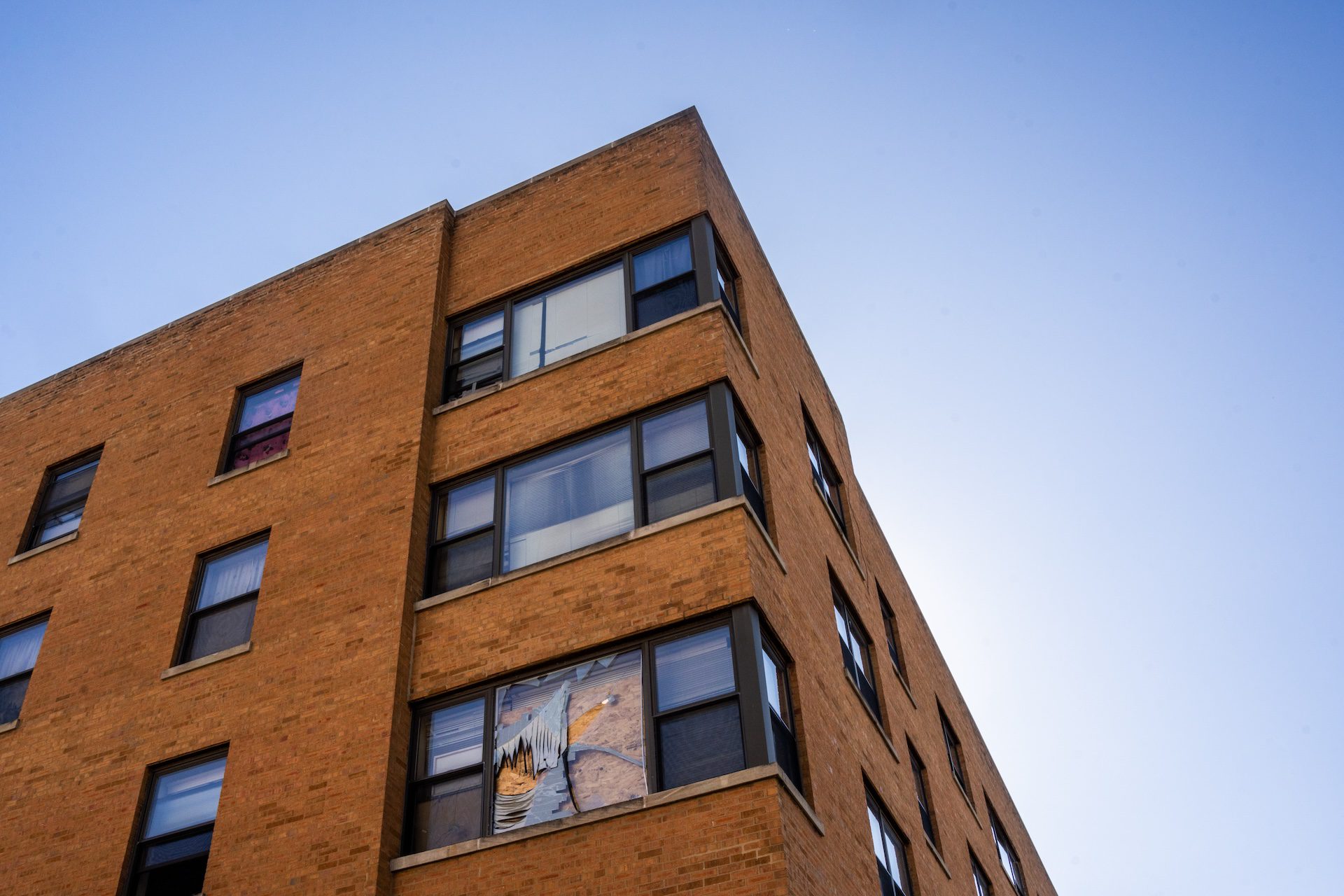 Camilla Forte/Borderless Magazine/Catchlight Local/Report for America
Camilla Forte/Borderless Magazine/Catchlight Local/Report for AmericaLo que debes saber si agentes federales de inmigración se presentan en tu edificio o dañan tu propiedad.
Tras la redada de agentes federales en un edificio de apartamentos de South Shore en septiembre, los informes revelaron grandes daños al edificio y a los bienes personales de los residentes, incluidas puertas rotas, muebles dañados y objetos personales desaparecidos.
"Me siento derrotado porque las autoridades no están haciendo nada," dijo Dan Jones, residente del edificio, a WBEZ al volver a casa del trabajo y descubrir que le faltaban sus pertenencias.
Los arrestos y redadas, como la del 7500 S. South Shore Drive, que forman parte de la "Operación Blitz Midway," han dejado a miembros de la comunidad lidiando con daños a pertenencias personales y la desaparición de amigos y familiares.
Noticias que ponen el poder en el punto de mira y a las comunidades en el centro.
Suscríbase a nuestro boletín gratuito y reciba actualizaciones dos veces por semana.
A medida que los agentes federales utilizan tácticas cada vez más agresivas, muchos habitantes de Chicago cuestionan los límites de la autoridad federal y si los agentes pueden ser considerados responsables por daños a la propiedad y posibles violaciones de derechos civiles.
"La dificultad radica en que muchas veces la ley existe para abordar un problema que ya se ha producido," dijo Ryann Moran, abogada supervisora del Law Center for Better Housing (LCBH, por sus siglas en inglés).
Los organizadores del derecho a la vivienda animan a los miembros de la comunidad a ponerse en contacto con sus vecinos y formen coaliciones para prepararse y defenderse mutuamente en caso de una redada.
"Se puede defender a un edificio de apartamentos de una forma que no se puede defender... a las personas que van a trabajar, a la lavandería o a hacer sus actividades cotidianas," dijo Danny Rosa, organizador de All-Chicago Tenant Alliance (ACTA, por sus siglas en inglés).
Borderless habló con expertos jurídicos y organizadores de derechos de vivienda para obtener consejos sobre cómo prepararse y responder a las interacciones con el Servicio de Inmigración y Control de Aduanas (ICE, por sus siglas en inglés) y otros agentes federales, así como qué pueden hacer los miembros de la comunidad si los agentes dañan su propiedad.
Este artículo tiene fines educativos e informativos únicamente y no debe interpretarse como asesoramiento legal.
¿Tengo que compartir mi estatus migratorio con mi arrendador?
Según la Ley de Protección de Inquilinos Inmigrantes, los arrendadores no pueden recopilar datos sobre la ciudadanía de los inquilinos. Tampoco se les permite discriminar a un inquilino por su ciudadanía o la percepción de la misma.
A menos que vivas en una vivienda subvencionada por el gobierno federal, no tienes que compartir tu estatus migratorio al propietario.
Moran dijo que los propietarios pueden hacerte otras preguntas que les ayuden a adivinar tu estatus, como, por ejemplo, si podrás pagar el apartamento. Pero preguntar directamente por tu estatus es ilegal, dijo.
¿Qué puedo hacer si mi arrendador me amenaza con llamar al ICE?
Según la Ley de Protección de Inquilinos Inmigrantes, es ilegal que tu arrendador te amenace con llamar a los agentes de inmigración.
Si tu arrendador te amenaza con llamar al ICE, tienes el derecho a demandarle por daños y perjuicios ante los tribunales.
Para ayudar a construir tu caso, los expertos recomiendan que:
- Documentes las amenazas por escrito haciendo capturas de pantalla y guardando los mensajes de texto o los correos electrónicos intercambiados.
- Busca testigos.
- Las amenazas verbales son más difíciles de probar, pero contar con alguien que pueda corroborar tu versión puede ayudar.
No:
- Grabes conversaciones con el propietario u otras personas del edificio sin obtener el consentimiento de todas las personas grabadas.
- La ley vigente de escuchas de Illinois prohíbe grabar una "conversación privada" sin el consentimiento de todas las partes.
También puedes denunciar amenazas e intimidaciones de los propietarios a grupos de ayuda mutua o a las autoridades locales.
- Para inquilinos de todo Chicago:
- Llama al teléfono de atención de Metropolitan Tenants Organization: 773-292-4988 (disponible los días laborables de 1 p.m. a 5 p.m.).
- Para residentes de Albany Park/Northwest Side:
- Llama a la línea directa de Autonomous Tenants Union: 872-216-5288
- Para reportar una mala conducta a los funcionarios de la ciudad:
- Ponte en contacto con tu concejal: Encuéntralos aquí
- Llama al 311 para denunciar una infracción del propietario y acceder a apoyo general si has sido desplazado.
¿Cuáles son mis derechos si los agentes del ICE u otros agentes federales de inmigración entran en mi edificio de apartamentos?
Las áreas comunes o compartidas, como patios o vestíbulos, pueden ser más difíciles de proteger, ya que son accesibles a todos los habitantes del edificio.
El interior de tu apartamento se considera un área privada, por lo que tienes derecho a negar la entrada a los oficiales federales de inmigración a menos que tengan una orden judicial firmada con tu nombre.
Una orden judicial o penal válida es:
- Creada por un tribunal;
- Firmada por un juez; y
- Tiene tu nombre legal completo.
Una orden administrativa de inmigración no está firmada por un juez y es creada por el Departamento de Seguridad Nacional (DHS, por sus siglas en inglés) o un oficial del ICE, según una declaración enviada por correo electrónico por Jonathan Meyer, ex asesor jurídico general del DHS y líder del equipo de seguridad nacional del bufete de abogados Sheppard Mullin.
"La forma más fácil de distinguirlos es buscar la firma de un juez," dijo Meyer.
Existen riesgos al negar la entrada a los oficiales de inmigración, añadió Meyer. Los oficialess pueden esperar en el vecindario para detener a alguien o iniciar una investigación contra un propietario.
Como propietario, ¿tengo que compartir información sobre mis inquilinos si los agentes federales la piden?
Meyer dijo que no hay una respuesta sencilla a si un propietario debe cooperar con las solicitudes de un agente federal. Los propietarios e inquilinos deben hablar con un abogado o experto legal si agentes federales les solicitan información, dijo.
"En general, los propietarios tienen la obligación [de] intentar proteger la privacidad de sus inquilinos en la mayor medida posible," dijo Meyer. "Pero puede haber situaciones en las que se justifique cierta cooperación."
¿Qué puedo hacer si agentes federales dañan mi propiedad?
Meyer dijo que existen procesos disponibles tanto a través del DHS como de los tribunales para obtener una indemnización si la propiedad de alguien ha sido dañada por agentes federales.
En virtud de la Ley Federal de Reclamaciones por Agravios, puedes:
- Presentar una reclamación directamente a la agencia responsable, como ICE o la Oficina de Aduanas y Protección Fronteriza (CBP, por sus siglas en inglés); o
- Demandar a la agencia federal responsable de los daños.
Más información
Meyer dijo que estos procesos pueden ser "complicados y largos." Es probable que las personas necesiten asesoramiento o apoyo legal para ayudar en su caso.
Meyer también añadió que, aunque el gobierno no debe tomar represalias contra alguien por ejercer sus derechos legales, si alguien sin estatus legal presenta una reclamación contra el gobierno, esto "llama la atención del gobierno."
"Proporcionar cualquier información al gobierno federal, incluso cuando has sido la víctima ... podría ser utilizado en tu contra," dijo Antonio Gutiérrez, un organizador de Organized Communities Against Deportations y Autonomous Tenants Union. "Podrían tomar represalias contra ti incluso por compartir lo que el gobierno federal le ha hecho a tu propiedad o a ti mismo."
Si los agentes federales dañan una propiedad, ¿quién es responsable de pagar la limpieza: el inquilino o el propietario?
Moran, la abogada de LCBH, dijo que su experiencia con daños a la propiedad ha sido principalmente en los casos en que la policía local, no agentes federales, ha dañado propiedad. En esas situaciones, los inquilinos han sido normalmente responsables de la limpieza, no los propietarios o las agencias gubernamentales.
Moran dijo que no está claro si los inquilinos están obligados a limpiar los daños causados a la propiedad por las fuerzas del orden federales, pero en general supondría que se espera que el inquilino cubra los costos de los daños.
¿Hay alguna forma para que inquilinos y propietarios se protejan de allanamientos o daños a la propiedad?
Rosa, de ACTA, dijo que una forma en que los inquilinos pueden lograr que sus edificios sean lugares más seguros y mejores para vivir es creando un sindicato de inquilinos.
Si los miembros de la comunidad están interesados en organizarse, Rosa dijo que pueden empezar por:
- Hablar con sus vecinos para conectarse.
- Crear un chat grupal (utilizando plataformas como WhatsApp o chats de grupo de texto) para compartir información y hacer planes de seguridad.
- Contactar a ACTA para obtener apoyo.
Añadió que los inquilinos sindicalizados pueden proteger a sus vecinos de las amenazas del ICE al:
- Crear planes de seguridad en caso de presencia del ICE.
- Designar a miembros voluntarios de la comunidad como escoltas de seguridad y vigilantes.
- Negociar con los propietarios para garantizar la seguridad de las entradas del edificio.
Katrina Pham es la reportera de participación de la audiencia de Borderless Magazine. Envía un correo electrónico a Katrina a [email protected].
Camilla Forte es becaria de CatchLight y miembro de Report for America cubriendo las comunidades inmigrantes para Borderless Magazine. Puedes contactarla por correo electrónico a [email protected].


